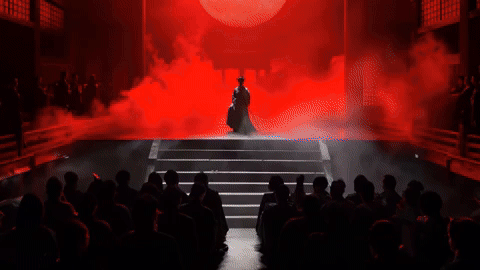If you’re a frequent user of art-sharing sites such as ArtStation and DeviantArt, you probably have seen the image of a dark red prohibition sign that reads “No To A.I. Generated Images.”

As A.I. art generation sites like Midjourney and Stable Diffusion became more easily accessible and prevalent in the past year, artists in Western countries have been raising concerns about technology stealing their original work.
In December of last year, online protests broke out on ArtStation, where artists flooded the site’s homepage with the above prohibition image, urging platforms to take more responsibility for protecting the creative field.
Similar protests have also reached the Chinese internet as concerns about A.I.-generated content continue to grow online.
Last September, the A.I. program ERNIE, developed by China’s leading search engine Baidu, had artists cautioning about the technology’s potentially negative impact on innovation and creativity. The tension reached a boiling point when artists on Lofter, a Tumblr-like platform developed by Chinese internet technology company NetEase, protested the platform’s launch of a new built-in A.I. art generator on March 7.

Lofter first started in 2011 as a community for photographers and soon gained popularity among writers and illustrators for supporting original content. Artists have relied on the platform to showcase their work and build networks within the creative community.
Many users saw the launch of Lofter’s A.I. generator as a blunt betrayal of what the platform used to stand for, and many have voiced their intent to leave the platform.
The “No To A.I. Generated Images” poster quickly dominated the A.I. drawing section on Lofter. A related hashtag also started trending on Weibo, China’s top microblogging site, amassing around 90 million views in less than six hours.

Lofter quickly put out a statement saying the A.I. art generator it launched is only used for producing profile images for users, as they found that many of their users frequently change profile photos.
Lofter also claims it only created the generator to encourage more free expression and had no intention of profiting from it. The platform stressed that all training data came from open-source databases.
According to the statement, if users find that the generator has copied their work, the platform will compensate the original creator 10,000 RMB (1,440 USD) per piece.
The platform also promises to launch an anti-crawling function that will prevent A.I. from ripping-off original content and plans to issue stricter regulations to help differentiate A.I. works from original content.

However, many Lofter users and content creators are unsatisfied with the response, claiming that Lofter doesn’t understand or respect its core audience.
“A.I.-generated works are getting more views than those created by hardworking illustrators on the platform. What a joke,” wrote one Weibo user.
Users have demanded that the platform take down the A.I. function, but Lofter has yet to show any intention of complying.
This is not the first time Lofter has come under fire over A.I. Similar complaints about copyright violations also arose when the platform launched an A.I. writing function in 2021.

The advancement of A.I. has become a concern within the global creative field, with real legal battles going on. The most prominent case recently was Getty Images suing Stable Diffusion over copyright infringement.
Countries around the world have been struggling to come up with their own ways to deal with the complications that have arisen with the proliferation of A.I. platforms.
China banned any A.I.-generated work without a clear watermark in January 2023. While in the U.S., the Biden administration released a non-binding ‘A.I. Bill of Rights’ in an attempt to create a safe and effective system.
The discussion on how we should approach and regulate A.I. will continue as we enter uncharted territory with its advancement.
Cover image via VCG


















